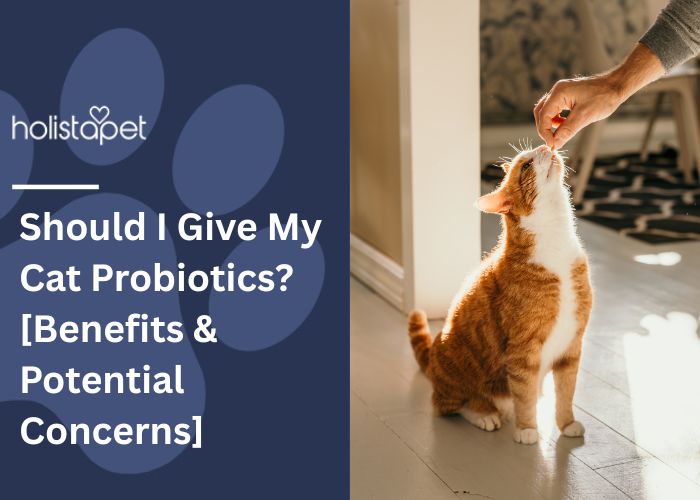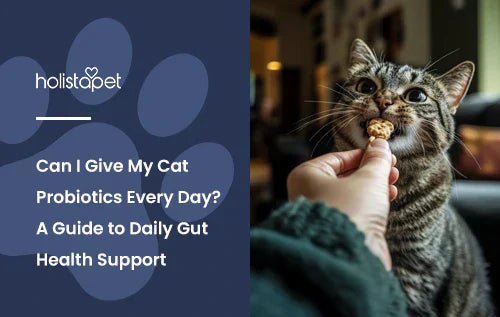Do you ever find yourself asking, "Should I give my cat probiotics?" The answer often depends on your cat's digestive health and general well-being. But no need to overthink things because we have the ultimate pet parent's guide to probiotics right in this article.
Probiotics introduce live, healthy bacteria into the gut, promoting balance and maintaining digestive health. They can help address various gastrointestinal concerns and even improve immune function. If your kitty's gut health needs a boost, probiotics may be a natural solution to consider.
🐾 Key Takeaways
-
Probiotics are live bacteria that support gut balance and digestion in cats. They can help ease diarrhea, gas, and digestive upset, especially after antibiotics. Cats with food sensitivities or allergies may also benefit from probiotic use.
-
Prebiotics feed good bacteria; pairing them with probiotics can enhance results. Many vets recommend probiotics and prebiotics for immunity and digestion support.
-
Signs your cat may need probiotics include poor appetite, loose stools, or stress.
-
Probiotics are generally safe but should be introduced slowly.
-
Always choose cat-specific strains and follow your vet’s advice for best results.
What Are Probiotics and How Do They Help Cats?

Probiotics are live microorganisms, mostly good bacteria, that live in your cat's digestive tract. They help maintain gut flora balance, which is key to smooth digestion. When your kitty's gut hosts plenty of helpful bacteria, it can better break down food, absorb nutrients, and keep bad bacteria in check.
Probiotics contribute to healthy feces and help reduce cases of stomach upset. Supplementing with probiotics can certainly help improve your cat's gut health if they frequently experience digestive setbacks.
And did you know: Probiotics serve as an immune system booster, too. Since much of the body's immune system resides in the gut, probiotics can make it easier for your cat to fight off illness-causing bacteria.
Probiotics vs. Prebiotics: What's the Difference?
As discussed, probiotics are live bacteria that help maintain your cat's gut health. Meanwhile, prebiotics act like food for those good bacteria, helping them grow and stay strong. Think of probiotics as helpful guests and prebiotics as the snacks that keep them around longer.
Together, these two help maintain a healthy balance in the digestive tract. While probiotics add helpful bacteria, prebiotics feed the ones already in the gut. This teamwork supports digestion, boosts immunity, and keeps unhealthy gut bacteria at bay. Taking both can better maintain gut health.
Does My Cat Need Probiotics?

Your cat might need probiotics if their digestive function isn't quite right. Feline pets that often experience digestive health problems can benefit from a steady supply of good bacteria. Probiotics help restore the healthy balance in the gut and ease all that discomfort.
Pets coming off antibiotics or dealing with food sensitivities may also find probiotics helpful. They support digestion and immunity, especially when your cat's gut bacteria need a boost. Including probiotics in their diet can be a gentle way to support their overall wellness.
Benefits for Digestion, Immune Support, and More
Probiotics offer numerous health benefits for your cat's digestive system and beyond. For one, they help break down food and absorb nutrients. This means fewer digestive problems like gas or loose stools. This smoother digestion keeps your kitty feeling comfortable and energetic.
Beyond digestion, probiotics also support your cat's immune system. They do so by supporting healthy bacteria that fight off illness-causing microbes. A strong immune system means fewer infections and better overall health.
Cats With Food Sensitivities, Allergies, or Digestive Issues
Cats dealing with food sensitivities or allergies often face digestive challenges. Probiotics can help soothe their stomach by promoting a healthy gut balance. This can then help reduce tummy upset and irritation.
For cats with chronic digestive issues, probiotics support the digestive tract and help maintain colonic health. Adding probiotics to their diet can help ease discomfort linked to digestive sensitivities and help keep their gut flora healthier over time.
Do Vets Recommend Probiotics for Cats?
Many vets suggest probiotics as a helpful addition to a cat's diet, especially when digestion is a concern. Probiotics support a balanced gut, which can help improve digestion and strengthen the immune system. Vets also often recommend probiotics during or after antibiotic treatment. This helps replenish the good bacteria lost while taking the medication.
Bonus tip: If you're curious about other ways to support your cat's health and wellbeing, ask your vet about HolistaPet's CBD for cats. Our broad-spectrum CBD treats, chews, oil tinctures, and capsules may help promote calm and ease discomfort. You can learn more about these products on our website.
How To Tell if My Cat Needs Probiotics

If your cat often has diarrhea, gas, or a poor appetite, these could be signs their gut bacteria are out of balance. Such digestive problems suggest your feline friend might benefit from taking probiotics to restore a more balanced gut environment.
Behavioral clues can also point to gut disruption. Affected felines may act anxious or uncomfortable when their digestive system feels off. Watching for these signs can help you decide when it's time to add probiotics to your pet's routine.
Types of Probiotic Supplements for Cats
Probiotics come in several forms, making it easy to find one that fits your kitty's preferences. Each type offers a way to add live bacteria to support your feline friend's digestive health. You can choose from:
-
Chews. Probiotic chews are tasty, easy-to-give treats packed with beneficial bacteria.
-
Powders. Sprinkle probiotic powder on your cat's food for a simple boost.
-
Capsules. Probiotic pills are convenient, as you can give them directly or hide them in food.
-
Fermented Food Options. These are natural sources of probiotics found in some special cat foods or supplements. Examples include pet-safe kimchi, sauerkraut, fermented fish treats, and fermented seaweed.
Are Probiotics Safe for Cats?

Probiotics are generally safe for feline pets, but it's best to introduce them slowly. Starting with a small dose helps your cat's digestive system adjust and reduces the chance of minor side effects like mild gas or bloating.
Always follow your veterinarian's advice when adding probiotics to your cat's diet. Your vet can guide you on the best probiotic product and dosage. With the right approach, probiotics can be a helpful addition to your best friend's wellness routine.
FAQs - Should I Give Probiotics to My Cats?
This section will answer common questions about probiotics, helping you make smart decisions. From how often to give them to which strains work best, we're here to keep you informed. Let's get into the answers that matter most for your kitty's wellness.
How often should I give my cat probiotics?
The frequency of giving probiotics depends on your cat's needs. For general gut health, daily probiotics work well and help maintain a good balance of gut bacteria. Some felines may only need probiotics during cases of stomach upset or after antibiotic treatment.
Always follow the product instructions or your vet's guidance. Consistency is important for probiotics to effectively support a healthy digestive system. Adjusting the schedule based on their response will help keep their gut on track.
Do indoor cats need probiotics?
Indoor cats can benefit from probiotics just like outdoor cats. Even without outdoor exposure, they may face digestive problems due to dietary changes, stress, or antibiotic use. Probiotics help maintain a healthy gut bacteria balance no matter where your kitty spends their time.
Adding probiotics to an indoor cat's routine supports digestion and immune health. It can also help reduce the chance of digestive upset caused by common indoor stressors or changes in food. Keeping your kitty's gut healthy is a win, indoors or out.
Can I give human probiotics to my cat?
It's tempting to share your probiotics with your cat, but human probiotics aren't always the best fit for feline digestion. Cats have different gut bacteria needs, so their probiotics contain specific strains designed just for them.
Using human probiotics could cause digestive upset or fail to provide the benefits your pet needs. Always choose probiotics made for cats or ask your vet for recommendations to keep your pet's gut status on point.
Can you give a cat too many probiotics?
Yes, giving too many probiotics can cause mild digestive irritation like gas or bloating. Always follow dosage instructions and introduce probiotics gradually to avoid upsetting your cat's stomach.
If you notice any adverse reactions, slow down or pause the supplement and talk to your vet. Moderation helps probiotics support your cat's gut without causing discomfort or digestive issues.
What probiotic strains are good for cats?
Some probiotic strains stand out for promoting a stable gut. Enterococcus faecium and Lactobacillus acidophilus are common ones found in cat probiotics. These strains boost beneficial bacteria and fight off bad gut bacteria.
Choosing probiotics with these strains can help your pet's digestion and immune system. Look for products that clearly list these strains to make sure your four-legged companion gets the best support.
Final Thoughts: Should You Give Your Cat Probiotics?
Probiotics can offer many benefits, from better digestion to stronger immune function. Deciding whether to give your cat probiotics depends on their tummy situation and any ongoing issues with their health.
Starting a probiotic routine gently and with veterinary guidance helps your kitty enjoy the benefits safely. If your feline friend struggles with digestion or you want to boost their overall wellness, probiotics might be a great addition to their diet. Try it and see for yourself.
Discover more about your cat’s nutritional needs.







![Probiotics For Dogs [Soft Chews] - HolistaPet](http://www.holistapet.com/cdn/shop/files/Probiotic-Infographic-1_472d7a29-e30c-435a-9638-1365d8c3a9f9.jpg?v=1725384841&width=104)
















 CBD Oil for Cats - Fast Acting
CBD Oil for Cats - Fast Acting
 CBD Cat Treats - Easy Dose
CBD Cat Treats - Easy Dose
 CBD Calming Chews for Cats - Highly Rated
CBD Calming Chews for Cats - Highly Rated
 CBG Oil for Dogs and Cats - Loved by Thousands
CBG Oil for Dogs and Cats - Loved by Thousands




Leave a comment
All comments are moderated before being published.
This site is protected by hCaptcha and the hCaptcha Privacy Policy and Terms of Service apply.